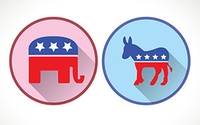 You’d
think it was July 2016 -- just months before the 2016 presidential election -- with all the political news we’ve seen in Real-Time Daily.
You’d
think it was July 2016 -- just months before the 2016 presidential election -- with all the political news we’ve seen in Real-Time Daily.
In truth, I wanted to wait to write a
blog touching on this topic. There will undoubtedly be more developments in the political programmatic advertising space over the next 16 months.
But if once is chance, twice is coincidence
and three times is a trend, then what does six make?
TubeMogul, a programmatic video ad platform, on Monday announced the opening of a new office in Washington, D.C. The company has tapped
Matthew Dybwad as head of political and public affairs to lead the new office.
TubeMogul's announcement marks the sixth ad tech-related political story in the past seven business days. This
new wave of political programmatic movement kicked off when iHeartMedia tapped
Kenny Day as SVP of political sales and strategy, noting that he would work closely with the company’s newly-launched programmatic ad platform.
advertisement
advertisement
Following that announcement, Rubicon
Project opened a new office in Washington, D.C. to better serve its political
clients, a UW-Madison associate professor received a grant to build a tool that
will track how ad tech firms are “microtargeting” potential voters and Rocket Fuel announced that it would add about 15 people to its Politics and Advocacy team to
beef up its own Washington, D.C. office.
Additionally -- though it is now obvious that this was a precursor to today's announcement from TubeMogul -- the company last week released data showing that political video ads bought via programmatic has
already begun picking up stream, especially in the early primary states.
Political marketers have always been at the forefront of real-time data usage. Their attraction to programmatic ad tech
is a no-brainer.
Gallup and Roper polls serve as examples of “real-time” data -- or near-real-time data, to be more accurate -- being put to use well before the programmatic ad
technologies of today existed. But the latest in ad tech allows political marketers to reach audiences faster, and, at least in theory, with more accuracy.
In fact, it’s unlikely
that these political advertisers will simply use the tech in a ho-hum manner. The platforms are even being tweaked to be “tailor-made” for political advertising purposes, at least
according to a statement made by TubeMogul’s VP of Media Mark Rotblat.
It’s entirely possible that the most savvy political programmatic advertisers will help break new ground in
ad tech. Deadlines spur action: Is there any greater deadline than a (potentially) one-time shot at becoming U.S. President on November 8, 2016?
Take radio “programmatic”
advertising for example. In its current iteration, it allows marketers to use data for targeting purposes and it automates parts of the RFP process, but it’s still not “real-time.”
Jeff Haley, CEO of Marketron, recently told Real-Time Daily: “While it's possible to inject advertising into the radio logs within minutes of a buy, we do not see this as a likely
path for radio for some time to come, with the possible exception of political.”
If political advertisements push ad tech forward in a space like radio, it’s not a stretch
to imagine it could happen in other areas as well, namely television.